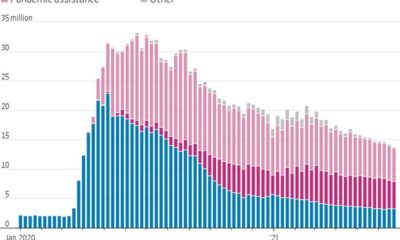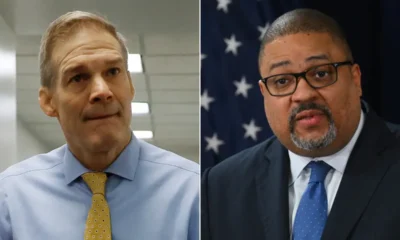Featured
Forbes Center welcomes Harrisonburg, Rockingham fifth-graders for live arts – Augusta Free Press
Neque porro quisquam est, qui dolorem ipsum quia dolor sit amet, consectetur, adipisci velit, sed quia non numquam eius.

More than 450 fifth-grade students in Harrisonburg City Public Schools and Rockingham County Public Schools will get to see master storyteller Charlotte Blake Alston and jazz violinist Diane Monroe in Fiddlin’ with Stories thanks to the Forbes Center for the Performing Arts’ partnership with Any Given Child Shenandoah Valley.
The Forbes Center is the premier performance partner of Any Given Child Shenandoah Valley, a 501(c)(3) organization focused on ensuring equitable access in the arts for all children in grades K-8 in Harrisonburg.
Students will have the opportunity to attend a matinee on April 19. The 80-minute performance will be followed by a question-and-answer session with Alston and Monroe. Alston wrote the program with her late brother, jazz violinist John Blake, Jr. The show focuses on how ancient and modern stringed instruments have played an integral role in the African and African American communities through folktales, stories and songs.
The Forbes Center is actively involved in educational outreach and has committed to offering varying groups and age ranges within K-8 the chance to experience at least two live performances and one dance workshop per season, according to Regan Byrne, executive director of the Forbes Center and a member of the Board of Directors for Any Given Child Shenandoah Valley. When Byrne booked an evening performance of Fiddlin’ with Stories for the 2021–2022 Forbes Center Masterpiece Season, she also booked the school matinee. Byrne says she makes “a conscious decision to book ‘Forbes Family Fun’ shows that align with the HCPS and RCPS educational goals.”
Now in their ninth season, Forbes Family Fun shows were introduced by the Center to provide quality performing arts programming for young audiences and their families. This year’s Forbes Family Fun series is sponsored by Shenandoah Valley Airport and has included a free school matinee to Catapult, the world’s premier shadow dance company, for 450 HCPS sixth and seventh graders. Charlotte Blake Alston and Diane Monroe in Fiddlin’ with Stories is also tapped as a Forbes Family Fun show—which includes a ticketed performance on Tuesday, April 19 at 6:30 p.m.
Byrne worked with the guest artists as well as J.R. Snow, director of Any Given Child Shenandoah Valley, to determine the appropriate age range for the Fiddlin’ with Stories school matinee. “We are excited to welcome fifth graders to this performance. It is the first time some of these students have had the opportunity to experience live arts in a professional theatre setting.”
This year’s partnership with Any Given Child Shenandoah Valley has also included two dance workshops at the Forbes Center. These interactive dance experiences introduced over 900 RCPS third graders to various forms of movement and dance terminology.
In addition, the School of Music hosted over 1000 fourth graders in HCPS and RCPS in February in the 1100-seat Wilson Hall as part of its Orchestra Discovery Concert series. The Conductor’s Spellbook program featured the JMU Symphony Orchestra with narration by Foster Beyers, JMU director of orchestras.
Forbes Center student matinees and Orchestra Discovery Concerts have reached over 7,500 students since 2019.
Tickets to Charlotte Blake Alston and Diane Monroe in Fiddlin’ with Stories are $34–35 with a $15 child’s ticket. For tickets, visit www.jmuforbescenter.com or call the Forbes Center Box Office at (540) 568-7000. For more information on Any Given Child Shenandoah Valley,
Enter your email address to subscribe to this blog and receive notifications of new posts by email.
Augusta Free Press launched in 2002. The site serves as a portal into life in the Shenandoah Valley and Central Virginia – in a region encompassing Augusta County, Albemarle County, Nelson County and Rockingham County and the cities of Charlottesville, Harrisonburg, Staunton and Waynesboro, at the entrance to the Blue Ridge Parkway, Skyline Drive, Shenandoah National Park and the Appalachian Trail.
Featured
Is The AI Infrastructure Boom A Bubble Or The New Railroads?
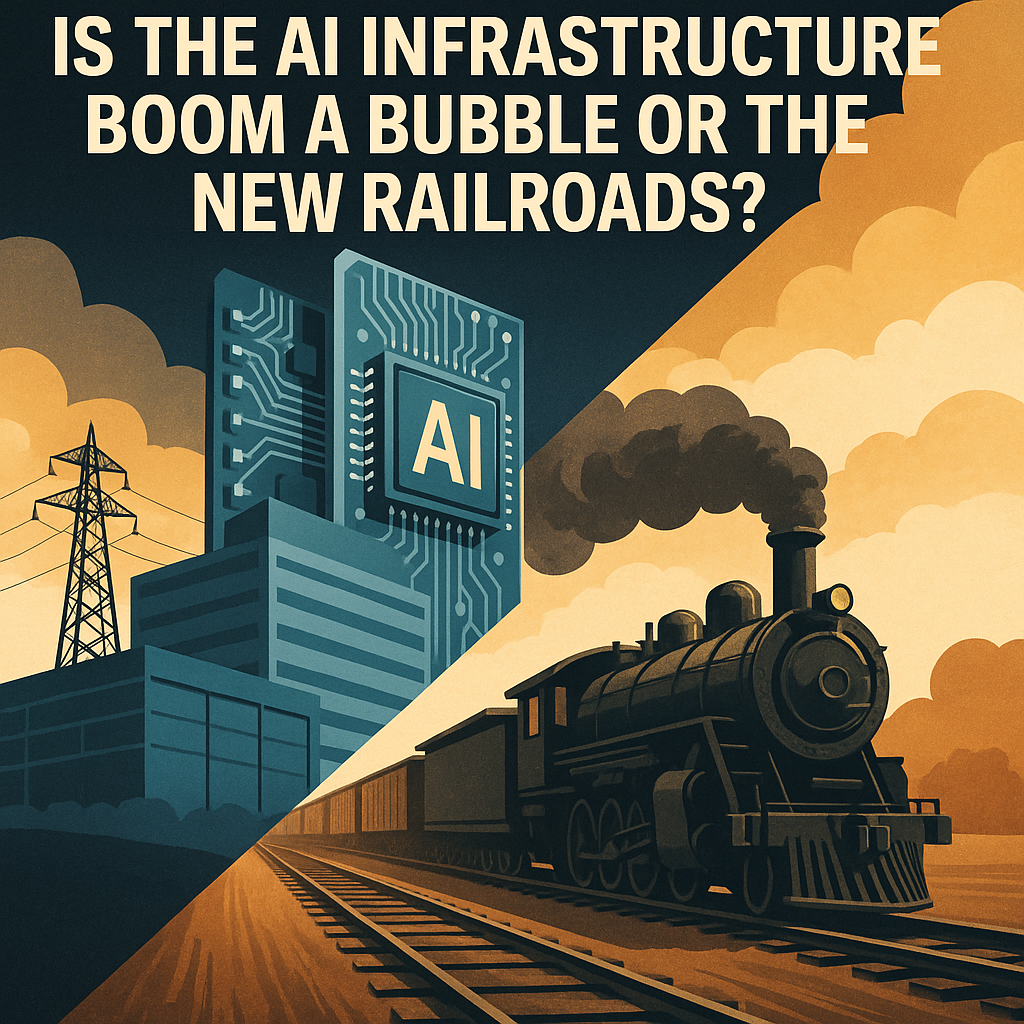
In the 1800s, railroads changed everything. Investors poured money into tracks, trains, and land. Many railroad companies went broke, but the rails they laid reshaped trade, cities, and entire countries for more than a century.
Today, AI infrastructure is having a similar moment.
Tech giants are spending hundreds of billions of dollars on data centers, AI chips, fiber networks, and long-term energy deals. Industry forecasts suggest that global data center spending could reach a trillion dollars a year by the end of the decade, driven mostly by AI. At the same time, companies making AI chips are reporting historic revenues, with data center divisions bringing in tens of billions of dollars per quarter and holding most of the market for AI processors.
So the big question is simple: is this AI infrastructure boom just a shiny bubble waiting to pop, or are we watching the birth of a new foundational system for the world economy—like the railroads once were?
The honest answer is that it has traits of both. To see why, we have to look at what is actually being built, who is paying for it, and what history has already taught us about big technology build-outs.
What “AI Infrastructure” Really Means
When people talk about “AI infrastructure,” they’re not just talking about one thing like a single server or a chatbot. It’s an entire stack of hardware and physical assets that work together.
At the bottom are the chips and servers: GPUs and special AI accelerators built by companies like Nvidia, AMD, and now in-house by big players such as Google, Amazon, and others. These chips sit inside powerful servers that are designed specifically for AI training and inference.
Those servers live in data centers—huge buildings filled with racks of machines. These facilities need advanced cooling systems, backup power, strong physical security, and high-speed connections to the rest of the internet. They are often built near cheap and reliable power sources, and close to major network routes.
Around all of this is the networking and storage layer. AI workloads need to move huge amounts of data between servers very quickly, so companies are investing in high-speed fiber networks, specialized switches, and massive storage systems that can hold training data, user data, and all the outputs of AI models.
Finally, there is the energy and cooling piece. AI infrastructure consumes a lot of electricity and produces a lot of heat. That means long-term contracts with utilities, investments in new power generation, and new cooling technologies like liquid cooling and immersion systems.
Taken together, this is more than a tech upgrade. It is a full-scale physical build-out—land, steel, concrete, power lines, water, and chips. That’s why the comparison to railroads, highways, and the early internet keeps coming up.
The Boom By The Numbers
However you slice it, the growth curve is steep. Analysts estimate that data center infrastructure spending in recent years has already reached the hundreds of billions of dollars annually and could push toward a trillion dollars per year by 2030. A big share of that is being driven by AI workloads, not traditional computing.
Capital spending by the major cloud providers—Amazon, Microsoft, Google, Meta, and a few others—has jumped sharply. In some recent years, these companies have been spending more than half of their operating cash flow on capital projects, much of it tied directly to AI infrastructure. At the same time, revenue from AI-powered cloud services is growing quickly, but it is still catching up with the speed of the build-out.
On the chip side, it’s the same story. The leading AI chipmaker has posted record quarterly revenues from its data center business, with results up dramatically year-over-year. Its gross margins are extremely high and it still controls the vast majority of the AI GPU market. Even as big tech companies design their own custom chips to reduce dependence, those custom chips still live inside the same broader ecosystem of data centers and networks.
Then there is the power situation. Global data center electricity consumption is expected to at least double by 2030, and AI is the main driver of that growth. In some countries, data centers are on track to become one of the largest single categories of electricity demand. In the United States, forecasts suggest that power demand from data centers could more than double again this decade, and AI-focused sites are a major reason why.
Put together, these trends describe a build-out that is not small or temporary. It is large, fast, and reshaping other sectors, especially energy.
Why Many People See A Bubble
Even with all that growth, there are clear warning signs that remind people of past bubbles.
The first warning sign is that spending is far ahead of clearly proven returns in many areas. Corporate and investor money is flowing into AI infrastructure at a speed that seems to outrun the direct revenue it generates today. In simple terms, a lot of companies are building capacity now and hoping that demand, pricing, and use cases will catch up later. This is the same pattern we saw during the dot-com boom and the telecom fiber build-out in the late 1990s, when companies laid far more fiber than the market needed at the time.
The second warning sign is concentration risk. The AI infrastructure boom relies heavily on a small number of key players. A handful of cloud providers control most of the AI data center build-out. One or two companies control most of the high-end AI chips. Thousands of startups and even many large enterprises depend on those same providers for both computing power and distribution. If any link in that chain stumbles—because of a business misstep, a supply chain problem, or new regulation—the effects can spread quickly through the system.
A third concern is what you might call “capex fatigue.” Analysts are already watching for the point where investors and boards start to question whether every new billion dollars of spending on GPUs and data centers is earning an acceptable return. Some forecasts suggest that while AI-related capital spending will remain high in absolute terms, its growth rate will slow later in the decade, simply because you cannot keep increasing at the same explosive pace forever.
On top of all this sit regulatory and political risks. Unlike railroads in the nineteenth century, AI infrastructure is being built under heavy public and political scrutiny. Governments are still arguing over rules for data privacy, safety, competition, and security. New regulations can raise costs, slow deployments, or limit certain types of AI applications. That adds another layer of uncertainty to these massive long-term investments.
When you put these factors together—spending far ahead of clear returns, heavy concentration, investor fatigue, and regulation—it is not surprising that many people call the current moment a bubble.
Why It Also Looks Like The New Railroads
At the same time, there is a strong case that AI infrastructure is more than just hype. In fact, the long-term picture does look a lot like a new railroad age.
One key point is that the world is reorganizing itself around compute. Most major industries are weaving AI into their daily operations. Health care systems are testing AI for diagnosis, triage, and drug discovery. Banks are using AI for fraud detection, trading support, and personalized financial advice. Manufacturers are using AI for robotics, predictive maintenance, and supply chain planning. Media companies and software firms are building AI into content creation, customer support, and product development.
Even if some of today’s most talked-about applications prove to be overhyped, the general direction is clear: businesses want more computing power that is cheaper, faster, and smarter. Once you rewire your operations around AI-heavy workflows, you do not simply turn them off the next year.
Another important point is the durability of the physical footprint. Data centers, power lines, and fiber networks are long-lived assets. Many facilities are designed to operate for twenty years or more. Even if specific AI models fall out of favor or particular companies fail, the buildings, the power connections, and the fiber routes usually get reused. Something similar happened with the excess telecom fiber built in the 1990s. A lot of that “dark fiber” later became the backbone of affordable broadband, video streaming, and cloud computing.
Energy is another area where AI and infrastructure start to look like railroads and coal. AI data centers are already reshaping energy demand and planning. Companies are signing long-term energy contracts, funding new power plants, and pushing for upgrades to local grids. In some cases, AI data centers are directly tied to new investments in nuclear power or renewables because they can be steady, predictable customers for large amounts of electricity. Just as railroads influenced where coal mines, steel mills, and ports were built, AI data centers are beginning to influence where new energy projects are developed.
Finally, AI infrastructure is being treated as a matter of national strategy. Many countries now talk about “sovereign AI” and want their own national data centers and chip projects so they are not fully dependent on foreign players. Governments are funding supercomputing clusters, university partnerships, and national AI centers. When something becomes part of a country’s long-term strategy, it tends to stick, even if some early projects over-spend or underperform.
Lessons From Railroads, Telecom, And The Dot-Com Era
History gives us an important lesson: two things can be true at the same time. A massive build-out can be a financial bubble for many individual companies, and at the same time, the underlying infrastructure can be essential and transformative for the long run.
Railroads are the classic case. Many railroad investors lost money as lines went bankrupt, merged, or were wiped out in panics. Yet the tracks they laid became the backbone of trade and travel for over a century, long after the original owners were gone.
Telecom and the dot-com era tell a similar story. There was a huge overbuild of fiber optic networks in the late 1990s. When the bubble burst, lots of companies went under and investors lost billions. But that “extra” fiber capacity later helped make internet access cheaper and more widely available. It became the infrastructure for Web 2.0, video streaming, cloud computing, and mobile apps.
AI infrastructure is very likely to follow this same general pattern. Some data centers will be poorly located or under-used. Some chip capacity will go idle when new generations of hardware arrive or when companies shift strategies. Many AI startups will fail to find sustainable business models.
But the networks, facilities, and platforms that survive will become part of the permanent wiring of the global economy. The winners may be different from the early leaders, but the category itself is not going away.
Bubble Or New Railroads? A Better Way To Look At It
So is the AI infrastructure boom a bubble or the new railroads? The most accurate answer is that it is both, depending on which level you look at.
On the surface, there are clear bubble-like features: rapid and concentrated spending, sky-high expectations, and real questions about whether every dollar of investment will produce a fair return. Some companies will almost certainly overbuild, misjudge demand, or get crushed by competition and regulation.
But at a deeper level, AI infrastructure has the same feel as past foundational build-outs. It is reshaping how industries work, how energy is planned, how nations think about strategy, and how people access services and information. The physical and digital layers being laid down now—data centers, chips, fiber, power—will be very hard to unwind.
A more useful question than “bubble or not” is this: where do you want to be positioned when the build-out slows and the market matures?
What This Means For Leaders And Investors
For executives, founders, and investors, this moment calls for clear thinking rather than hype or fear.
First, it helps to think in terms of “picks and shovels,” not just “gold miners.” In the railroad era, it was not only the railroad owners who made money. Steelmakers, construction companies, telegraph providers, and land developers also benefited. In the AI era, the same will be true for companies providing power, cooling, networking equipment, storage, and foundational software tools that sit between raw compute and end-user applications.
Second, focus on utilization and real value, not just access. Buying the latest and greatest AI hardware or signing the largest cloud contract is not a strategy by itself. The key questions are how much of that capacity you actually use, what you pay per unit of compute, and whether it supports work that truly matters to your customers and your bottom line.
Third, take the energy story seriously. If your business depends on AI workloads, you need to understand where your data centers are, how power is being secured, what the local grid constraints are, and how environmental rules could change costs. Just as physical location mattered for railroads, the “where” of your AI infrastructure will matter for cost, reliability, and resilience.
Finally, expect a shake-out but not a collapse. It is reasonable to assume that growth in AI capital spending will slow later in the decade and that some players will fail. Regulations will likely tighten. Competition will increase. But once governments, banks, hospitals, factories, and global supply chains tie themselves to AI-driven systems, they are not going to walk away from this infrastructure.
The Bottom Line
The AI infrastructure boom has all the drama of a classic bubble: aggressive spending, a few dominant winners, anxious investors, and a lot of unproven business models. At the same time, underneath the noise, the world is quietly laying down a new kind of rail—a global, always-on, AI-optimized computing layer that will sit beneath energy, finance, health care, logistics, media, and more.
Some investors will lose money. Some projects will be written off. Some data centers will never reach the returns their backers imagined. But as with railroads and fiber networks, the infrastructure that remains will shape how value moves through the world for decades.
The real challenge is not to predict the exact moment when the hype cools off. The real challenge is to decide where you want to stand when the dust settles and the tracks are already laid.
Featured
Ron Holloway Is Helping Everyday People Build Wealth Through Land Deals — One Blueprint at a Time
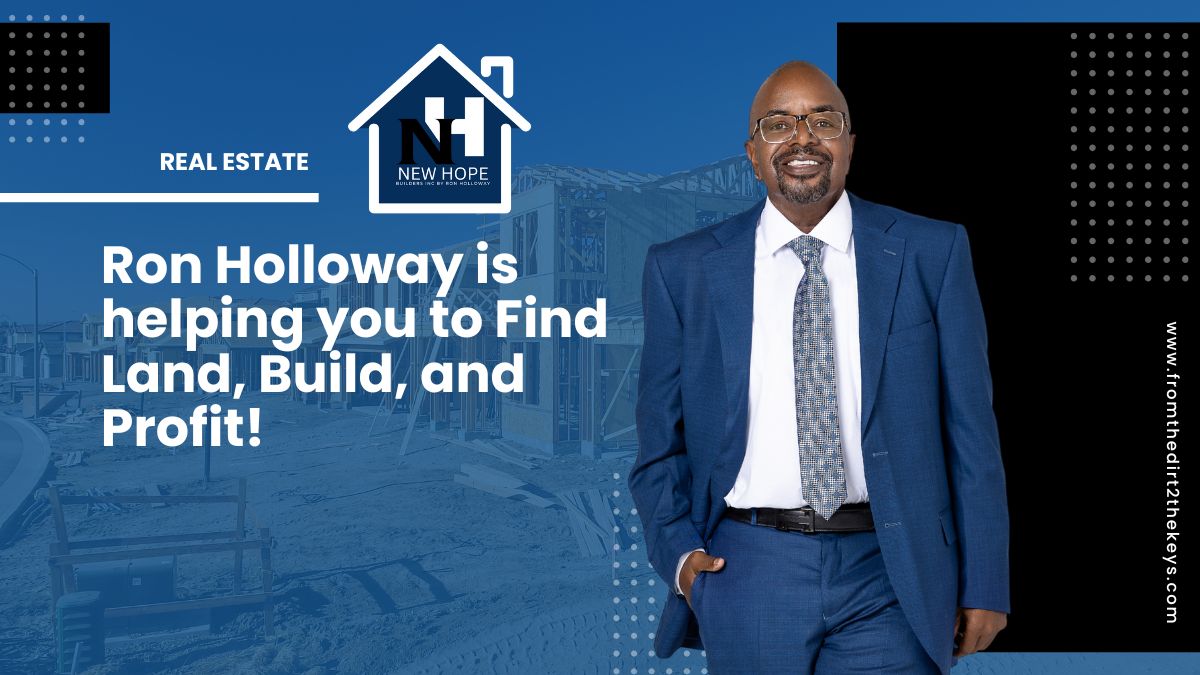
In a world where real estate often feels out of reach for everyday people, Ron Holloway, developer, coach, and founder of New Hope Builders, Inc, is proving that with the right strategy, anyone can get in the game.
With more than two decades of experience, Ron has built a million-dollar empire, closed over eight figures in real estate deals, and developed more than 100 homes across Virginia and beyond. But what truly sets him apart is his passion for teaching others how to do the same—no matter their background or starting point.
“Most people look at an empty lot and just see dirt,” Ron says. “I see opportunity. And my mission is to show people how to turn that dirt into dollars, deals, and legacy.”
From Developer to Educator
Ron’s journey began as a hands-on builder and investor. Over the years, he developed a keen eye for spotting profitable land opportunities—often before anyone else saw the potential. Through trial, error, and strategic planning, he built a thriving business and became known for his ability to break down complex real estate concepts into clear, actionable steps.
Now, through workshops, coaching programs, and his newly released book, Ron is sharing his exact methods with aspiring investors, entrepreneurs, and coaches who want to build wealth through land development.
Launching “From the Dirt to the Keys”
Ron’s new book, From the Dirt to the Keys: The Blueprint to Profitable Land Deals & Dream Homes, officially launched on October 18, 2025, at the Russell Innovation Center for Entrepreneurs in Atlanta, Georgia.
The event was more than a book signing—it was a hands-on workshop where attendees learned how to evaluate land, run profit numbers, and create their own real estate strategies. Ron also introduced his 4-Week Coaching Intensive, designed to help participants put the blueprint into action immediately.
Making Real Estate Accessible
Ron’s approach is refreshingly practical. Instead of overwhelming people with jargon, he focuses on clear steps:
- Step 1: Start with zoning and land fundamentals.
- Step 2: Run quick, realistic numbers.
- Step 3: Know your exit strategy before you buy.
This framework has already helped countless individuals take their first steps toward profitable land deals—many of whom had zero real estate experience beforehand.
A Mission Rooted in Legacy
For Ron, this work is bigger than business. It’s about creating generational wealth and empowering communities to invest strategically.
“My goal is simple,” Ron explains. “I want to make real estate investing accessible. If you have the willingness to learn, I have the blueprint to help you win.”
To learn more about Ron Holloway and get a copy of his new book, visit: www.FromTheDirt2TheKeys.com
Featured
Mother of 7, Dr. DeShonda Jennings, Celebrates Parents & Childcare Heroes at 2025 Childcare Conference
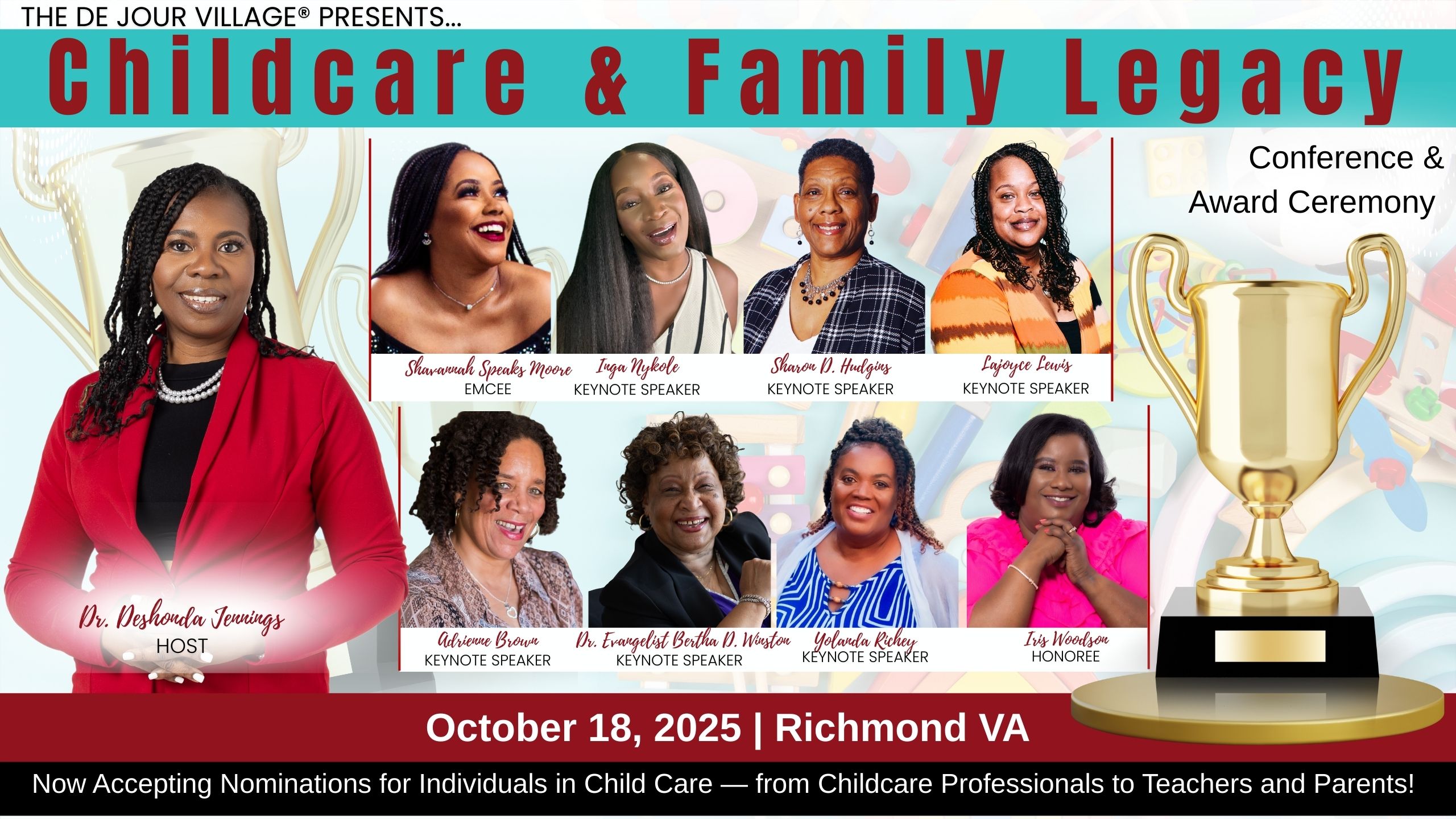
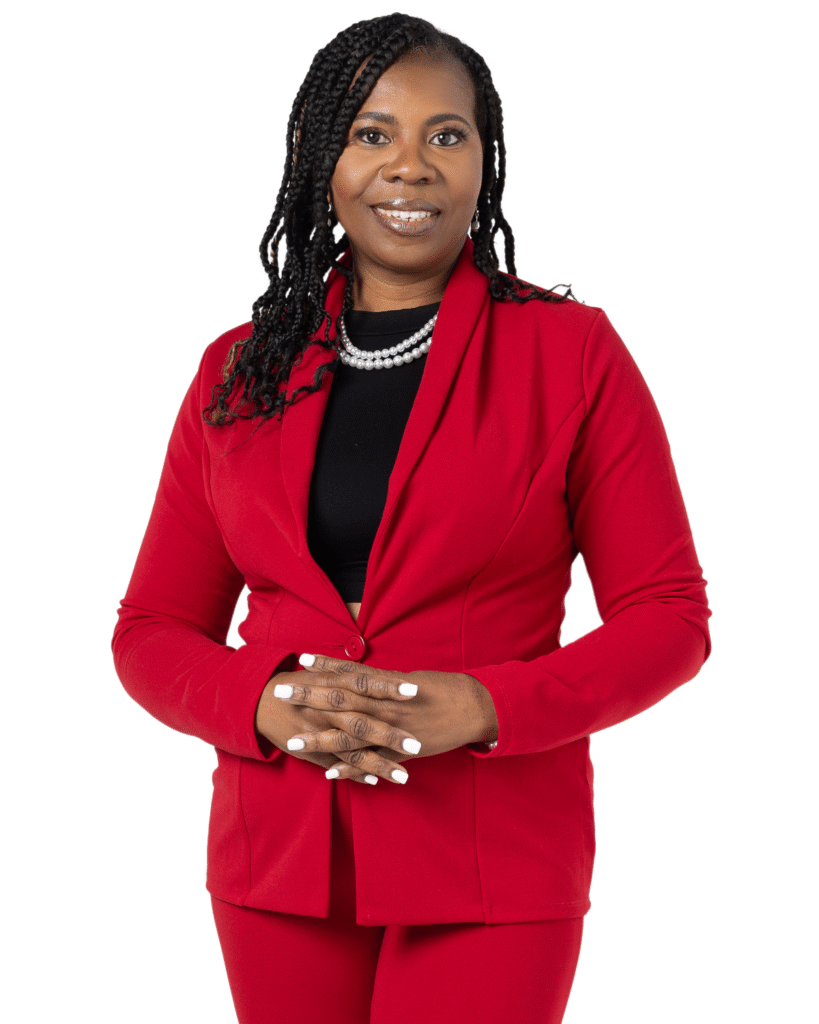
Dr. DeShonda Jennings is more than the loving mother of five — she’s a champion for parents, educators, and childcare professionals. This year, she’s using her platform to spotlight those who care for children every day and to recognize the often-unsung heroes behind early childhood development.
A Heart for Parents & Childcare Professionals
As a mother of five, Dr. Jennings understands firsthand the challenges, triumphs, and sacrifices that go into raising children. She knows how much work it takes — from balancing schedules to seeking quality care — and she wants to use her voice to lift up other parents and those who care for little ones.
This year, she’s leading the way in honoring the people who make childhood possible: the parents, daycare providers, teachers, home-based child care professionals, and others. Through her role in the upcoming Childcare Conference & Award Ceremony, she is calling attention to the dedication, creativity, and heart that these individuals pour into their work.
About the 2025 Childcare Conference & Award Ceremony
The Childcare Conference is designed to uplift, educate, and celebrate those in the childcare space — as well as parents who partner in their children’s growth. The event will feature:
- Powerful keynote sessions
- Breakout workshops on business, leadership, funding, family engagement, and more
- VIP sessions (like getting Grant & Funding strategies)
- Networking with peers, experts, and advocates
- An awards ceremony unveiling honorees across multiple categories
Speakers, including Dr. Jennings, will dive into topics such as:
- Bridging parent–professional partnerships
- Financial strategies for childcare programs
- Leadership in early childhood settings
- Navigating current trends in childcare and education
The conference also offers two ticket tiers:
- General Admission — $147 (includes conference access, lunch, networking, vendor access) childcareconference.org
- VIP Ticket — $297 (includes VIP seating, VIP luncheon, special breakout sessions, swag, and more) childcareconference.org
VIP seats are limited, so early registration is encouraged. childcareconference.org
A hotel block is available at Four Points by Marriott / Sheraton near Richmond Airport, allowing attendees to stay close to the venue and local attractions. childcareconference.org
The Awards — Recognizing Excellence from All Corners
One of the highlights of this conference is the Awards for Childcare Excellence — a red carpet event that honors both childcare professionals and parents. Categories include:
- Infant Teacher of the Year
- Toddler Teacher of the Year
- Pre-K Teacher of the Year
- Early Childhood Educator of the Year
- Childcare Professional of the Year
- Home Day Care Leadership
- Family Day Home Leadership
- Homeschool Educator
- And others childcareconference.org
Nominations open now and run through September 30, 2025. childcareconference.org Voting begins July 1, 2025. childcareconference.org While voting helps gauge interest, final recipients are chosen based on how well the nominees meet the criteria, not just popularity. childcareconference.org
To receive an award, nominated individuals must attend the conference — awards will not be mailed. childcareconference.org
Why Dr. Jennings’s Role Matters
By centering her story — as a mother of five — Dr. Jennings gives this event personal weight. She helps bridge the worlds of parent and professional, showing that strong childcare is a community responsibility. Her leadership and visibility bring attention and credibility to those often working behind the scenes.
Her keynote will not only inspire those in attendance, but also remind all participants — whether parent or provider — that they are seen, appreciated, and essential.
How to Get Your Ticket & Be Part of This Celebration
To join the conference and awards, people can purchase tickets via the official site: childcareconference.org.
(That’s where you can nominate someone, check workshop schedules, and reserve your spot.) childcareconference.org
Invitation is open to:
- Parents
- Daycare providers
- Home-based childcare professionals
- Educators
- Community leaders supporting families and early education
Whether you want to learn, connect, or receive recognition — this is your opportunity.
-

 Featured1 year ago
Featured1 year ago20 Entrepreneurs to Watch Closeout 2024
-

 Innovation2 years ago
Innovation2 years agoLeo Horacio: A Successful Entrepreneur in the Ecommerce and Online Sales Industry
-

 Innovation2 years ago
Innovation2 years agoInnovators in Social-Emotional Learning: Dr. Myava Clark and Chris Clark Jr.
-

 Music2 years ago
Music2 years agoArtist Deydee Signs $350,000 Contract with Rueda Empire LLC
-
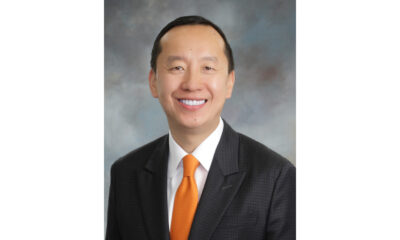
 Latest2 years ago
Latest2 years agoCharles zhang recognized by forbes as #1 on michigan’s 2022 best in state wealth advisor list
-
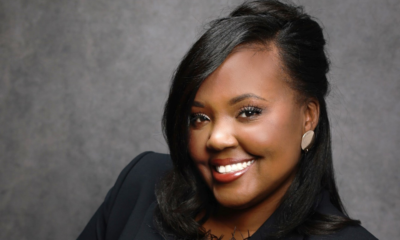
 Uncategorized1 year ago
Uncategorized1 year agoTrailblazer in Business: Alicia Fitts on Building Wealth and Community Through Faith
-
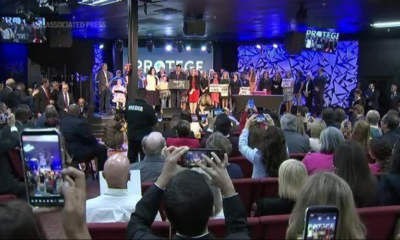
 Latest1 year ago
Latest1 year agoFlorida Gov DeSantis signs 15-week abortion ban | Latest News
-

 Lifestyle2 years ago
Lifestyle2 years agoPhillip Austin brings outlaw country to General Duffy’s stage – The Bulletin




